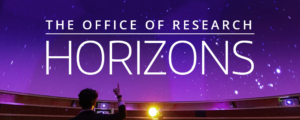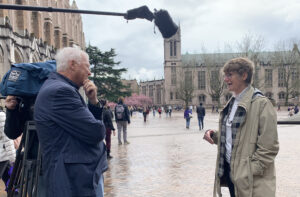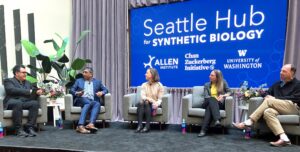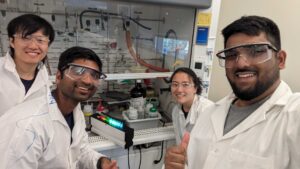Horizons Newsletter May 2024

A Message from the Vice Provost
 Greetings,
Greetings,
I’m happy to re-introduce you to the Office of Research (OR) quarterly newsletter Horizons, in which we aim to highlight internal research initiatives, showcase some of the exciting interdisciplinary research efforts at the UW, and make you aware of changing policies at the University, State, and/or Federal level.
This year, many Office of Research initiatives have been paused while we turn our efforts toward problem solving and stabilizing the grants processes in Workday. We know that the challenges of the Finance Transformation have resulted in numerous problems for researchers and added burden for the staff who support them. The need to address these problems is urgent. The Office of Research is working in close partnership with the Offices of Finance, Planning & Budgeting (FPB), and UW-IT on a variety of fronts in response.
Equally important, we have been working with lead research administrators across the three campuses to triage problems and collaboratively address needs. This newsletter will mention a few of our initiatives. We are starting to see meaningful progress and I am grateful to the many UW staff members who are going the extra mile to help. I know that there is much work still ahead but I am encouraged by the strong network of people working across school and college boundaries. Thank you for the ongoing partnership!
 This newsletter represents a first step in the Office of Research efforts to expand our communications to the UW research community, both to serve the goal of providing a supportive research ecosystem, and the goal of advocacy for the transformative discoveries and creative work happening at the UW.
This newsletter represents a first step in the Office of Research efforts to expand our communications to the UW research community, both to serve the goal of providing a supportive research ecosystem, and the goal of advocacy for the transformative discoveries and creative work happening at the UW.
To that end, we are also working with campus partners to develop new communication channels that will help us tell the compelling story of the UW’s world-class research impact and our culture of collaboration. I look forward to working with many of you to help tell this story.
Mari Ostendorf
Vice Provost for Research
News
Workday Stabilization
In our role as the primary support and advocacy body for the UW’s research community, the Office of Research is acutely aware that the transition to Workday has imposed many difficulties on researchers and their staff in setting up and managing their awards. We assure you that our top priority is to continue working with our campus partners and the research community to identify the problems, find the experts to solve them, and implement the solutions. Our efforts across functions include:
Reporting – Together with the eScience staff, FPB, UW-IT and campus partners, the Office of Research developed a suite of new Grant Reporting resources to provide clarity and support for grant management. These tools include a Grant Planning and Forecasting Tool, Post Award Dashboard, and Principal Investigator Dashboard.
ORIS – Working together with campus and Central Office users to address high impact improvements, the SAGE team has released:
- Performance improvements in award search and filtering, SAGE Budget, subawards, and task lists to improve system stability and shorten processing
- An integration between SAGE Budget and Workday Plans to reduce backlogs and data entry for GCA
- New search and filters in the Award Requests Lists to help users find key data
- Updates to SAGE email notifications and in-system help text
OSP – The Office of Sponsored Programs is actively working through the subaward request backlog. Week-over-week volumes show around 850 subaward actions in OSP at any given time, at various stages. OSP has also adjusted existing staffing from the Contracts team to the Subawards team to assist and anticipates filling two positions and adding temporary assistance. By early fall, OSP’s goal is to have subaward action totals down to 350, which is historically how many items are “in-flight” at any given time.
Training – The CORE team is working with GCA, OSP, and grant management experts to develop new learning materials and updated CORE courses to help research administrators confidently manage awards in the new Workday systems. To ensure their effectiveness and expedite the delivery of these tools, CORE is previewing these resources for research administrators in a weekly “Works-in-Progress” forum.
Communication – The Office of Research maintains the Workday Finance & Research webpage. This page is updated weekly with the latest information and resources to help the research community navigate the evolving Workday financial support system. The Office of Research is also a partner in the newly-formed Finance Training and Communication Collaborative (FINTAC), working with colleagues from FPB to identify cross-functional training and communication needs and develop strategies and resources to address them effectively.
Office of Research Leadership Members Appointed to AI Task Force
Members of the Office of Research leadership team are actively involved in the President’s and Provost’s new AI Task Force, convened to develop a campus-wide institutional strategy for artificial intelligence. Mari Ostendorf, Vice Provost for Research, is co-chairing the Research and Knowledge Creation/Transfer Group, Xiaosong Li, Associate Vice Provost for Research Cyberinfrastructure, is co-chairing the Infrastructure Working Group, and Andy Connolly, Associate Vice Provost for Data Science, is on the Executive Committee. Read more about the AI Task Force at the Provost’s Blog.
Initiatives and Events
Apply for an OR-hosted Discussion on Equity in Research for Excellence
The Office of Research invites UW researchers to apply to organize an OR-hosted meal and discussion of its recent Report on Equity in Research for Excellence. We invite proposals for collaborative dialogues with colleagues about the report and approaches towards and aspirations for equity in research.
Undergraduate Research Symposium
On May 17, the annual Undergraduate Research Symposium will bring together nearly 1,000 students from all three UW campuses and local institutions to present their research and creative work to the UW community. Mari Ostendorf, Vice Provost for Research, will give remarks at the Outstanding Undergraduate Research Mentor Awards, taking place at 9:30-10:45 am in Mary Gates Hall 220. Come be inspired by the impressive student work that spans more than 100 disciplines and the dedicated faculty mentors that support them.
UW Innovation Month
May 2024 is the first-ever UW Innovation Month, a campus-wide celebration of the innovative work happening across all disciplines at the UW. There is a full slate of programs and events highlighting students and researchers who are entrepreneurs, designers, engineers, scientists, artists, and leaders embodying the UW’s culture of innovation.
Call for Proposals for Research Networking Events
The Office of Research invites UW Faculty to apply to organize an OR-sponsored research networking event to be held in AY24-25. The events are intended to promote interdisciplinary dialogues on timely topics with the goal of spurring new collaborations. Look for a Limited Submissions announcement for more details.
At The Center
The Seattle Hub for Synthetic Biology
The UW Medicine Brotman Baty Institute has embarked on a landmark, five-year scientific collaboration with the Allen Institute and the Chan Zuckerberg Initiative, creating new technologies to record the history of cells. “Imagine being able to put a smartwatch into each of your cells to record to the genome itself, everything that cell is experiencing,” said BBI Scientific Director Jay Shendure, M.D., Ph.D., who serves as the initiative’s lead scientific director. The project, the Seattle Hub for Synthetic Biology, has the potential to transform how scientists study the role of cells and genes in human health by providing “unprecedented clarity” into how biological events unfold over time. Watch Dr. Jay Shendure describe the goals and vision of the Seattle Hub for Synthetic Biology in this video from UW Medicine.
NSF Center for Integration of Modern Optoelectronic Materials on Demand
IMOD is a collaborative community of 23 research groups at 11 institutions advancing new materials and devices that operate at the junction between light waves and electrical current (optoelectronics). The University of Washington is the hub for IMOD and is the home to six core research groups spread across four UW Departments: Chemistry, Physics, Electrical & Computer Engineering, and Mechanical Engineering. The work done in future optoelectronics will have enormous societal promise to reduce the energy demand of electronics, increase computational speeds, and enhance cyber security and quantum computing. Read more about IMOD at the UW.
Policy and Administration
NSF’s Proposal & Award Policies & Procedures Guide
The NSF’s new 2024 Proposal & Award Policies & Procedures Guide (PAPPG) will go into effect for proposals due on or submitted after May 20, 2024. The guide contains new requirements for PIs, including using Common Forms for the Biographical Sketch & Current and Pending (Other) Support, and proposal mentoring plans to include both postdocs and graduate students. The NIH plans to implement these forms in January 2025, and other agencies will likely also adopt these forms.
NSF Summary of Changes to PAPPG (NSF 24-1)
Guidance for Common Federal Disclosure Forms
Research Security Training
The federal CHIPS and Science Act requires completion of research security training by senior/key personnel listed on a federal application for a research and development (R&D) award. We anticipate the effective date of this requirement will coincide with the issuance of the 2025 National Science Foundation Proposal and Award Policies and Procedures Guide (PAPPG) for NSF proposals and other agencies will soon require compliance. Once effective, all senior/key personnel will be required to take the training within one year of the R&D application. Required training focused on Research Security is already available from the National Science Foundation. The UW has determined that completing all four training modules meets institutional requirements. Currently, research project-specific training in Export Controls, a component of Research Security, is required for certain activities. Contact the UW Office of Export Controls for guidance as well as information on training, where it is required.
Federal Closeout Reporting Guidance
NIH and other agencies are strengthening enforcement of closeout reporting. Recipients have 120 days to submit reports. If not completed within one year, the agency will implement unilateral closeout. If that occurs, corrective action includes suspension, termination, or withholding support. GCA is prioritizing closeout-related Federal Financial Reports to comply with this guidance. Please be aware of the requirements for submitting final technical reports!
Consequences for Late or Missing Progress Reports
Closeout Reporting Requirements Guidance
Limited Submissions
The Office of Research maintains a directory of Limited Submission Opportunities: grants, awards and fellowships that limit the number of applications coming from one institution. For each limited submission opportunity, the Office of Research notifies deans, directors, chairs and faculty of the opportunity details, general directions, and deadlines for internal submission of pre-proposals. Subscription to this listserv is open to all. To subscribe or unsubscribe, please email limitedsubs@uw.edu.
Upcoming Limited Submissions Opportunities
Training Opportunities
SAGE
The SAGE Awards Course provides an overview of the award and modification process in SAGE for all research staff creating and tracking Award Setup and Modification Requests.
Upcoming course: May 8, 1 – 3:30 pm
SAGE Office Hours: For help with SAGE Budgets, awards, modifications, and everything in between, join our weekly SAGE Office Hours to speak with SAGE experts from ORIS and OSP.
View the SAGE Office Hours schedule
Biomedical Research Integrity (BRI) Training
The Office of Research, UW Medicine, and Fred Hutchinson Cancer Research Center are providing Biomedical Research Integrity (BRI) training to enable all pre- and post-doctoral researchers supported by U.S. Public Health Service (PHS) grants to meet their Responsible Conduct of Research training requirements. The 2024-2025 BRI schedule offers the required in-person eight-hour training on two dates:
September 5, 2024, 8:30 am-4:30 pm, North Ballroom, UW Hub
March 18, 2025, 8:30 am-4:30 pm, North Ballroom, UW HUB
Registration opens soon – for more information visit the BRI page
CORE
Works-in-Progress Weekly Sessions: The CORE team now hosts a weekly “Works-in-Progress” forum to preview learning resources in development and get feedback from users before they are published. These live Zoom sessions take place every Friday and are open to everyone in the UW research community. These sessions are recorded, and the evaluation surveys and recordings are posted at the webpage for those that cannot attend the live sessions.
View the “Works-in-Progress” schedule
Navigating the New Frontier of Financial Reporting for Grants Managers Course: This new CORE course is designed to make a grant manager’s most common Workday interactions easy to understand and provides an overview of the financial concepts and reports they will use to manage sponsored awards.

